Tia Silverthorne Bach's Blog, page 59
April 10, 2013
In Medias Res & IBGW = I: Blogging from A to Z
Welcome to a day of I. Clogging the blogosphere with posts dedicated to I could get a little self-involved. Thank goodness it's for the Blogging from A to Z Challenge, so I posts will cover a range of topics.
Okay, enough of my play on the letter I and first person. On to I...
In Medias Res
(Encyclopedia Britannica)
Latin: “in the midst of things” In narrative technique, the recommended practice of beginning an epic or other fictional form by plunging into a crucial situation that is part of a related chain of events; the situation is an extension of previous events and will be developed in later action. The narrative then goes directly forward, and exposition of earlier events is supplied by flashbacks. The principle is based on the practice of Homer in the Iliad and the Odyssey.
When done right, the prerequisite for most literary devices, in medias res drops the reader right into the thick of the action. No complaints here, because few things make me happier than being invested in a story from page one. Then, we can explore the inner workings of the characters.
Think of the Bond or Bourne movies. It wouldn't be the same to have those movies begin with Bond and Bourne sorting out their feelings over all the people they've killed or their lost loves. No, these need to begin with an insane action sequence.
On the flip side, in medias res wouldn't really work for a romance novel. You need to build up to two people falling in love. One of my biggest complaints with romance novels is the "looked across a crowded room and fell instantly in love" relationship. Make me care about the characters and then have them fall in love.
And a bonus I for Indie writers.
 Indie Books Gone Wild (IBGW)
, the brainchild of the lovely
Jo Michaels
, is a great resource for indie writers. In addition to articles on important indie topics, the site offers the following services: editing, beta-reading, proofreading, print book formatting, and open critique services/writing class.
Indie Books Gone Wild (IBGW)
, the brainchild of the lovely
Jo Michaels
, is a great resource for indie writers. In addition to articles on important indie topics, the site offers the following services: editing, beta-reading, proofreading, print book formatting, and open critique services/writing class.
I am currently using them to edit my YA novel, Chasing Memories, and I recently joined them as an editor. Take a moment to read my bio and check out the other amazing team members here .
Hope everyone is enjoying A to Z this year. To check out other A to Z bloggers, please visit the Blogging from A to Z participant list .
Okay, enough of my play on the letter I and first person. On to I...
In Medias Res
(Encyclopedia Britannica)
Latin: “in the midst of things” In narrative technique, the recommended practice of beginning an epic or other fictional form by plunging into a crucial situation that is part of a related chain of events; the situation is an extension of previous events and will be developed in later action. The narrative then goes directly forward, and exposition of earlier events is supplied by flashbacks. The principle is based on the practice of Homer in the Iliad and the Odyssey.
When done right, the prerequisite for most literary devices, in medias res drops the reader right into the thick of the action. No complaints here, because few things make me happier than being invested in a story from page one. Then, we can explore the inner workings of the characters.
Think of the Bond or Bourne movies. It wouldn't be the same to have those movies begin with Bond and Bourne sorting out their feelings over all the people they've killed or their lost loves. No, these need to begin with an insane action sequence.
On the flip side, in medias res wouldn't really work for a romance novel. You need to build up to two people falling in love. One of my biggest complaints with romance novels is the "looked across a crowded room and fell instantly in love" relationship. Make me care about the characters and then have them fall in love.
And a bonus I for Indie writers.
 Indie Books Gone Wild (IBGW)
, the brainchild of the lovely
Jo Michaels
, is a great resource for indie writers. In addition to articles on important indie topics, the site offers the following services: editing, beta-reading, proofreading, print book formatting, and open critique services/writing class.
Indie Books Gone Wild (IBGW)
, the brainchild of the lovely
Jo Michaels
, is a great resource for indie writers. In addition to articles on important indie topics, the site offers the following services: editing, beta-reading, proofreading, print book formatting, and open critique services/writing class.I am currently using them to edit my YA novel, Chasing Memories, and I recently joined them as an editor. Take a moment to read my bio and check out the other amazing team members here .
Hope everyone is enjoying A to Z this year. To check out other A to Z bloggers, please visit the Blogging from A to Z participant list .
Published on April 10, 2013 04:00
April 9, 2013
Handy Hyperbole = H: Blogging from A to Z
Welcome to Day H in the Blogging from A to Z Challenge. Continuing with my theme of literary devices, today I present hyperbole.
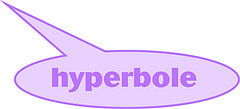 Source
Hyperbole
Source
Hyperbole
(source)
A hyperbole is an extreme exaggeration used to make a point. It is like the opposite of “understatement.” It is from a Greek word meaning “excess.”
Hyperbole is an excellent tool for writers. Since we want to create vivid descriptions for readers, what better way than an extreme exaggeration to make a point?
Examples:
"There did not seem to be brains enough in the entire nursery, so to speak, to bait a fishhook with."
---Mark Twain, A Connecticut Yankee in King Arthur's Court
"People moved slowly then. There was no hurry, for there was nowhere to go, nothing to buy and no money to buy it with, nothing to see outside the boundaries of Maycomb County."
---Harper Lee, To Kill a Mockingbird
As crafty as writers can be, I nominate parents as the best users of hyperbole.
Think about it, what parent hasn't said, "I've told you a million times"? Or, a favorite one from prior generations: "I walked to school uphill, both ways." Another fun one, "I'll knock you from here till next Tuesday."
What's your favorite hyperbole? My daughter votes for, "I'm so hungry I could eat a horse."
Hankering for more H... check out other A to Z participants here .
 Source
Hyperbole
Source
Hyperbole(source)
A hyperbole is an extreme exaggeration used to make a point. It is like the opposite of “understatement.” It is from a Greek word meaning “excess.”
Hyperbole is an excellent tool for writers. Since we want to create vivid descriptions for readers, what better way than an extreme exaggeration to make a point?
Examples:
"There did not seem to be brains enough in the entire nursery, so to speak, to bait a fishhook with."
---Mark Twain, A Connecticut Yankee in King Arthur's Court
"People moved slowly then. There was no hurry, for there was nowhere to go, nothing to buy and no money to buy it with, nothing to see outside the boundaries of Maycomb County."
---Harper Lee, To Kill a Mockingbird
As crafty as writers can be, I nominate parents as the best users of hyperbole.
Think about it, what parent hasn't said, "I've told you a million times"? Or, a favorite one from prior generations: "I walked to school uphill, both ways." Another fun one, "I'll knock you from here till next Tuesday."
What's your favorite hyperbole? My daughter votes for, "I'm so hungry I could eat a horse."
Hankering for more H... check out other A to Z participants here .
Published on April 09, 2013 04:00
April 8, 2013
Gratifying vs Grating Grammar = G: Blogging from A to Z
I'm a self-confessed grammar geek, so I couldn't pass up the opportunity to highlight proper grammar as a literary device.
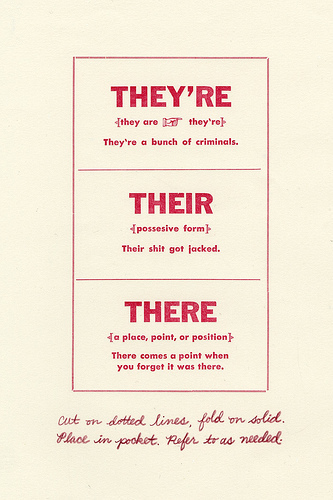 SourceEven great story cannot overcome obvious grammar sins, at least for me. Matter of fact, I'm even more disgusted when a great story is ruined by lack of editing and bad grammar than a bad story. A bad story was going to be a bad story regardless. A great story is wasted when poor grammar is rampant.
SourceEven great story cannot overcome obvious grammar sins, at least for me. Matter of fact, I'm even more disgusted when a great story is ruined by lack of editing and bad grammar than a bad story. A bad story was going to be a bad story regardless. A great story is wasted when poor grammar is rampant.
Authors can break rules for the sake of style occasionally, think fragments or ending a sentence with a preposition, but it should be consistent and not cause undue stress on the reader.
Stress on the reader? Yes, anything that pulls the reader out of the story causes stress. Too much reading stress and the reader disconnects. Or at least this reader does.
But, even writers who fancy themselves grammar geeks need editors. It's easy to get in the zone, fingers flying across the keyboard, and accidentally put its instead of it's. Spell checkers can't help you, because both words are spelled correctly.
In past posts, I've not only pointed out my Top 10 Writing Pet Peeves (e.g., irregardless, lose/loose, they're/their/there) but also 5 Writing "Mistakes" I Like (e.g., sentence fragments, occasional adverbs).
“Ill-fitting grammar are like ill-fitting shoes. You can get used to it for a bit, but then one day your toes fall off and you can't walk to the bathroom.”
― Jasper Fforde, One of Our Thursdays Is Missing
What's your grammar pet peeve? Will it kill a great story for you?
Grammar should be gratifying, never grating. (Again, alliteration abounds in A to Z.) Note: I read and re-read this post more than any other for this month. Can't have mistakes in a post about grammar mistakes. Eek!
Don't forget to check out other A to Z participants here .
 SourceEven great story cannot overcome obvious grammar sins, at least for me. Matter of fact, I'm even more disgusted when a great story is ruined by lack of editing and bad grammar than a bad story. A bad story was going to be a bad story regardless. A great story is wasted when poor grammar is rampant.
SourceEven great story cannot overcome obvious grammar sins, at least for me. Matter of fact, I'm even more disgusted when a great story is ruined by lack of editing and bad grammar than a bad story. A bad story was going to be a bad story regardless. A great story is wasted when poor grammar is rampant.Authors can break rules for the sake of style occasionally, think fragments or ending a sentence with a preposition, but it should be consistent and not cause undue stress on the reader.
Stress on the reader? Yes, anything that pulls the reader out of the story causes stress. Too much reading stress and the reader disconnects. Or at least this reader does.
But, even writers who fancy themselves grammar geeks need editors. It's easy to get in the zone, fingers flying across the keyboard, and accidentally put its instead of it's. Spell checkers can't help you, because both words are spelled correctly.
In past posts, I've not only pointed out my Top 10 Writing Pet Peeves (e.g., irregardless, lose/loose, they're/their/there) but also 5 Writing "Mistakes" I Like (e.g., sentence fragments, occasional adverbs).
“Ill-fitting grammar are like ill-fitting shoes. You can get used to it for a bit, but then one day your toes fall off and you can't walk to the bathroom.”
― Jasper Fforde, One of Our Thursdays Is Missing
What's your grammar pet peeve? Will it kill a great story for you?
Grammar should be gratifying, never grating. (Again, alliteration abounds in A to Z.) Note: I read and re-read this post more than any other for this month. Can't have mistakes in a post about grammar mistakes. Eek!
Don't forget to check out other A to Z participants here .
Published on April 08, 2013 04:00
April 7, 2013
Knowing When to Quit: ROW80 Update
Last week was all about editing. Not only did I have my editor's first round edits in hand, I was working through suggestions from four amazing beta readers. Although I'm grateful for all of their input, and I know my novel will be better for it, it was a lot to take in. My head was spinning.
 I have what I like to call OED... obsessive editing disorder. I love the editing process, but I have a really hard time knowing when to quit. I'm convinced I could edit something until the end of time, so when is it good enough? Or, as my daddy always said, GED... good enough, dammit.
I have what I like to call OED... obsessive editing disorder. I love the editing process, but I have a really hard time knowing when to quit. I'm convinced I could edit something until the end of time, so when is it good enough? Or, as my daddy always said, GED... good enough, dammit.
It's Sunday, time to check in regarding my A Round of Words in 80 Days (ROW80) goals.
Updates...Publish Chasing Memories -- Edit #2 is done and back in the hands of my Editor, the lovely Jo Michaels. Survive the A to Z Blog Challenge -- Only done through H, so I plan to get through at least K tomorrow.Map out the sequel to Chasing Memories - As I was editing this past week, plot points for Book 2 were bombarding me. I have notes everywhere (truly, I think I have written on every piece of scrap paper in my house). This week I plan to organize them and add details.Make significant progress on the follow-up to Depression Cookies - The plan is to write two chapters this week. Note: In April, I am only going to do ROW80 updates on Sundays since I'm posting all the other days for A to Z. In May, I'll be back to Wednesday and Sunday posts.
Hope my ROW80 friends started Round 2 with a bang!
 I have what I like to call OED... obsessive editing disorder. I love the editing process, but I have a really hard time knowing when to quit. I'm convinced I could edit something until the end of time, so when is it good enough? Or, as my daddy always said, GED... good enough, dammit.
I have what I like to call OED... obsessive editing disorder. I love the editing process, but I have a really hard time knowing when to quit. I'm convinced I could edit something until the end of time, so when is it good enough? Or, as my daddy always said, GED... good enough, dammit.It's Sunday, time to check in regarding my A Round of Words in 80 Days (ROW80) goals.
Updates...Publish Chasing Memories -- Edit #2 is done and back in the hands of my Editor, the lovely Jo Michaels. Survive the A to Z Blog Challenge -- Only done through H, so I plan to get through at least K tomorrow.Map out the sequel to Chasing Memories - As I was editing this past week, plot points for Book 2 were bombarding me. I have notes everywhere (truly, I think I have written on every piece of scrap paper in my house). This week I plan to organize them and add details.Make significant progress on the follow-up to Depression Cookies - The plan is to write two chapters this week. Note: In April, I am only going to do ROW80 updates on Sundays since I'm posting all the other days for A to Z. In May, I'll be back to Wednesday and Sunday posts.
Hope my ROW80 friends started Round 2 with a bang!
Published on April 07, 2013 04:00
April 6, 2013
Flashforward & Flashback = F: Blogging from A to Z
Wouldn't it have been cool for F to fall on Friday? But, alas, it's fantastic to discuss F on Saturday.
 Source
Source
My whole life I've either had a book or a pen in my hand. I can remember staying up to all hours with a flashlight and a book, my parents constantly stopping by to beg me to put the book down and get some sleep.
When I close my eyes, I can see the cover of one of my... by New York Times bestselling author, Tia Silverthorne Bach.
Just a quick flashback and flashforward based on my life.
Flashback
(from The Free Dictionary.com)
A literary or cinematic device in which an earlier event is inserted into the normal chronological order of a narrative.
Flashforward
(from The Free Dictionary.com)
A literary or cinematic device in which the chronological sequence of events is interrupted by the interjection of a future event.
Both of these tools, if timed well, can add a lot to a story. However, they can easily throw the reader for a loop if not properly presented. Nothing is worse than reading a story that goes back and forth without giving readers time to adjust or even know where they are.
One of the best examples of well-done flashbacks I've read recently... Winter Garden by Kristin Hannah. (my review is here ) In Winter Garden, Kristin Hannah weaved past and present into an intricate and gut-wrenching tale.
Flashforward is another beast altogether. Where flashbacks are most often used to grow characters, flashforwards tend to build story by predicting what might happen. Or what really will happen in the case of time travel.
What's your favorite example of either flashforwards or flashbacks in either a book, movie, or television series?
Also, if you could flashforward into your future, what might you see?
Please take a moment to check out other F posts and some great A to Z participants here .
 Source
SourceMy whole life I've either had a book or a pen in my hand. I can remember staying up to all hours with a flashlight and a book, my parents constantly stopping by to beg me to put the book down and get some sleep.
When I close my eyes, I can see the cover of one of my... by New York Times bestselling author, Tia Silverthorne Bach.
Just a quick flashback and flashforward based on my life.
Flashback
(from The Free Dictionary.com)
A literary or cinematic device in which an earlier event is inserted into the normal chronological order of a narrative.
Flashforward
(from The Free Dictionary.com)
A literary or cinematic device in which the chronological sequence of events is interrupted by the interjection of a future event.
Both of these tools, if timed well, can add a lot to a story. However, they can easily throw the reader for a loop if not properly presented. Nothing is worse than reading a story that goes back and forth without giving readers time to adjust or even know where they are.
One of the best examples of well-done flashbacks I've read recently... Winter Garden by Kristin Hannah. (my review is here ) In Winter Garden, Kristin Hannah weaved past and present into an intricate and gut-wrenching tale.
Flashforward is another beast altogether. Where flashbacks are most often used to grow characters, flashforwards tend to build story by predicting what might happen. Or what really will happen in the case of time travel.
What's your favorite example of either flashforwards or flashbacks in either a book, movie, or television series?
Also, if you could flashforward into your future, what might you see?
Please take a moment to check out other F posts and some great A to Z participants here .
Published on April 06, 2013 04:00
April 5, 2013
Elegance & Euphuism = E: Blogging from A to Z
Welcome to another day of the Blogging from A to Z challenge.
An E literary device challenged me a bit. I didn't want to go with elegy, so I found a more interesting one. One that was a learning experience for me.
Euphuism
(Merriam-Webster)
1: an elegant Elizabethan literary style marked by excessive use of balance, antithesis, and alliteration and by frequent use of similes drawn from mythology and nature
2: artificial elegance of language
Named from Euphues (1579) the prose romance by John Lyly. According to Wikipedia: It (Euphues) consists of a preciously ornate and sophisticated style, employing in deliberate excess a wide range of literary devices such as antitheses, alliterations, repetitions and rhetorical questions. Classical learning and remote knowledge of all kinds are displayed.
"Is it not far better to abhor sins by the remembrance of others' faults, than by repentance of thine own follies?"Euphues
I can't say this strongly enough. This. Is. Not. My. Style.
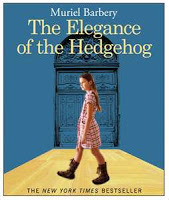 My book club read The Elegance of the Hedgehog this past year. Although an interesting read with an intriguing main character, at times the prose felt condescending. Translated from French,too often the author (or possibly, the translator) seemed to be poking fun at those who couldn't fully understand a heightened use of language.
My book club read The Elegance of the Hedgehog this past year. Although an interesting read with an intriguing main character, at times the prose felt condescending. Translated from French,too often the author (or possibly, the translator) seemed to be poking fun at those who couldn't fully understand a heightened use of language.
I'm a grammar geek and word nerd, but that doesn't mean I want to read Shakespeare or a Shakespeare wanna-be. Tell me a good story with proper grammar and you will make me happy. Most readers are not impressed with "big words" but worse... you never want to leave a reader feeling lost or insulted.
To me, poetry is where the best of all language should reside. When you have so few words to convey meaning, use the ones that have the most impact.
Are you impressed with elegance in literature? Or, what might be a better question, do you enjoy using your Kindle look-up-a-word feature? *smiles*
Please hop over and check out other Es here .
An E literary device challenged me a bit. I didn't want to go with elegy, so I found a more interesting one. One that was a learning experience for me.
Euphuism
(Merriam-Webster)
1: an elegant Elizabethan literary style marked by excessive use of balance, antithesis, and alliteration and by frequent use of similes drawn from mythology and nature
2: artificial elegance of language
Named from Euphues (1579) the prose romance by John Lyly. According to Wikipedia: It (Euphues) consists of a preciously ornate and sophisticated style, employing in deliberate excess a wide range of literary devices such as antitheses, alliterations, repetitions and rhetorical questions. Classical learning and remote knowledge of all kinds are displayed.
"Is it not far better to abhor sins by the remembrance of others' faults, than by repentance of thine own follies?"Euphues
I can't say this strongly enough. This. Is. Not. My. Style.
 My book club read The Elegance of the Hedgehog this past year. Although an interesting read with an intriguing main character, at times the prose felt condescending. Translated from French,too often the author (or possibly, the translator) seemed to be poking fun at those who couldn't fully understand a heightened use of language.
My book club read The Elegance of the Hedgehog this past year. Although an interesting read with an intriguing main character, at times the prose felt condescending. Translated from French,too often the author (or possibly, the translator) seemed to be poking fun at those who couldn't fully understand a heightened use of language.I'm a grammar geek and word nerd, but that doesn't mean I want to read Shakespeare or a Shakespeare wanna-be. Tell me a good story with proper grammar and you will make me happy. Most readers are not impressed with "big words" but worse... you never want to leave a reader feeling lost or insulted.
To me, poetry is where the best of all language should reside. When you have so few words to convey meaning, use the ones that have the most impact.
Are you impressed with elegance in literature? Or, what might be a better question, do you enjoy using your Kindle look-up-a-word feature? *smiles*
Please hop over and check out other Es here .
Published on April 05, 2013 04:00
April 4, 2013
Discussing Dialogue = D: Blogging from A to Z
I was torn on picking a literary device for D. Denouement is such a critical piece in any work of fiction, while deus ex machina is an important element for an editor to highlight. (deus ex machina = a machination, or act of God--resolving the primary conflict by means unrelated to the story, or an act of God)
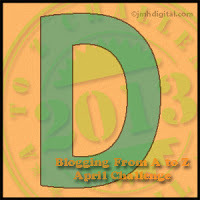 But ultimately I had to go with dialogue.
But ultimately I had to go with dialogue.
Effective dialogue must...
1) Sound like people speaking
Nothing is worse than reading dialogue that sounds like prose. I want to feel like I'm listening in on a private conversation.
2) Defines characters
Think about it... how do people get to know you in real life? Is it through a series of well-written, poetic journal entries? No, people get to know you through what you say. A speaker's dialect is an indication of where he/she is from, slang can suggest age/generation, and tone can say a lot about personality.
3) Quickens the pace
Too many paragraphs of description lose me every time. I'm a fast reader, and dialogue stays with me much longer than prose... and it doesn't slow me down, especially well-written, naturally flowing dialogue.
Dialogue can also be a road block.
For example, I don't want an author to spell words like a character says them. If it's clear that a character is from the deep South, for example, I don't need the words to reflect that. Think The Help. I'm from the South, and I could barely get through the first fifty pages of that book. Granted, I did get in the groove and ultimately loved the book. But don't tempt your reader to quit.
Second, writers should read their dialogue out loud. If you stumble, so will the reader. Unnatural dialogue is a death knell for story.
Will well-written dialogue make a book for you? Can poorly-written dialogue make you put one down?
Check out the other D posts here .
 But ultimately I had to go with dialogue.
But ultimately I had to go with dialogue.Effective dialogue must...
1) Sound like people speaking
Nothing is worse than reading dialogue that sounds like prose. I want to feel like I'm listening in on a private conversation.
2) Defines characters
Think about it... how do people get to know you in real life? Is it through a series of well-written, poetic journal entries? No, people get to know you through what you say. A speaker's dialect is an indication of where he/she is from, slang can suggest age/generation, and tone can say a lot about personality.
3) Quickens the pace
Too many paragraphs of description lose me every time. I'm a fast reader, and dialogue stays with me much longer than prose... and it doesn't slow me down, especially well-written, naturally flowing dialogue.
Dialogue can also be a road block.
For example, I don't want an author to spell words like a character says them. If it's clear that a character is from the deep South, for example, I don't need the words to reflect that. Think The Help. I'm from the South, and I could barely get through the first fifty pages of that book. Granted, I did get in the groove and ultimately loved the book. But don't tempt your reader to quit.
Second, writers should read their dialogue out loud. If you stumble, so will the reader. Unnatural dialogue is a death knell for story.
Will well-written dialogue make a book for you? Can poorly-written dialogue make you put one down?
Check out the other D posts here .
Published on April 04, 2013 04:00
April 3, 2013
Crafting Cliffhangers = C: Blogging from A to Z
 SourceContinuing my literary devices theme, today I wanted to talk about one that creates tension and keeps the reader engaged. I wanted to talk about...
SourceContinuing my literary devices theme, today I wanted to talk about one that creates tension and keeps the reader engaged. I wanted to talk about...Dunh-Dunh-DUNH
the...
Cliffhanger(Merriam-Webster)1: an adventure serial or melodrama; especially: one presented in installments each ending in suspense2: a contest whose outcome is in doubt up to the very end; broadly: a suspenseful situation
If you've ever seen a CSI episode, you know how corny cliffhangers can be. David Caruso, for example, pushes his glasses down his nose, tilts his head toward the camera, and makes some bad joke about a dead body, and then the CSI theme music blares before sending you off to a commercial. *rolling my eyes*
Sometimes a cliffhanger is at the end of a movie or book--a device used to bring the audience back for a future installment. They could be waiting months or years to find out what happened. Those kind of cliffhangers need to be spot on. People don't just wait for anything.
Great example: the sight of Han Solo being put on Boba Fett's plan, sealed in carbonite. I thought I would die until I made sure Hans Solo made it (and it was three years between films). Note: My teenage crush on Harrison Ford probably had a little something to do with how effective this cliffhanger was.
In books, cliffhangers can be at the end of a chapter, not to be resolved until the end of the book or spread across several books. The trick... it has to be big enough to grab the reader, without being so manipulative that the reader feels annoyed.
Or maybe that's a personal cliffhanger problem I have. If it feels contrived, I am put off. Or... if I can imagine David Caruso's cartoon-like face machinations and awkwardly unfunny word delivery along with theme music, not good.
What is your favorite cliffhanger scene in a book or movie?
And don't forget to visit other C blogs today here .
Published on April 03, 2013 04:00
April 2, 2013
Building Bildungsroman = B: Blogging from A to Z
Day 2 of the Blogging from A to Z Challenge. I hope everyone is boldly bantering about Bs today.
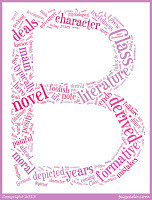
Bildungsroman
(from Merriam-Webster)
Class of novel derived from German literature that deals with the formative years of the main character, whose moral and psychological development is depicted. It typically ends on a positive note, with the hero's foolish mistakes and painful disappointments behind him and a life of usefulness ahead. It grew out of folklore tales in which a dunce goes out into the world seeking adventure.
Otherwise known as a coming-of-age story.
The books that have stayed with me over the years tend to feature a young character struggling to figure out the conflicts swirling around them. A great example... The Book Thief. In it, young Liesel faces the horrors of growing up in Germany during World War II. She has to grow up in circumstances that would destroy most adults. In horrific times, she finds her inner strength.
As a writer, I love to write these characters because the possibilities are endless. Young characters have one foot in childhood, and the naivete and wonderment associated with it, but they are testing the adult waters at the same time, trying to define who they want to be. They can be both optimistic and cynical, trusting and dubious. All in the span of a few minutes.
I disagree with the old saying that "youth is wasted on the young." The innocence and growth potential of youth would be wasted on those old enough to not embrace it, those already jaded by life events of pain and loss.
What is your favorite example of bildungsroman?
Take a few minutes to visit other blogs on the B journey here .

Bildungsroman
(from Merriam-Webster)
Class of novel derived from German literature that deals with the formative years of the main character, whose moral and psychological development is depicted. It typically ends on a positive note, with the hero's foolish mistakes and painful disappointments behind him and a life of usefulness ahead. It grew out of folklore tales in which a dunce goes out into the world seeking adventure.
Otherwise known as a coming-of-age story.
The books that have stayed with me over the years tend to feature a young character struggling to figure out the conflicts swirling around them. A great example... The Book Thief. In it, young Liesel faces the horrors of growing up in Germany during World War II. She has to grow up in circumstances that would destroy most adults. In horrific times, she finds her inner strength.
As a writer, I love to write these characters because the possibilities are endless. Young characters have one foot in childhood, and the naivete and wonderment associated with it, but they are testing the adult waters at the same time, trying to define who they want to be. They can be both optimistic and cynical, trusting and dubious. All in the span of a few minutes.
I disagree with the old saying that "youth is wasted on the young." The innocence and growth potential of youth would be wasted on those old enough to not embrace it, those already jaded by life events of pain and loss.
What is your favorite example of bildungsroman?
Take a few minutes to visit other blogs on the B journey here .
Published on April 02, 2013 04:00
April 1, 2013
Attempting Awesome Alliteration = A: Blogging from A to Z
Another A adventure advances...
 Source
Source
If ever there was a month that exudes alliteration, it is April and the A to Z challenge. With a letter theme, most of us try to come up with witty and memorable titles using alliteration.
Alliteration
(Merriam-Webster)
The repetition of usually initial consonant sounds in two or more neighboring words or syllables (as wild and woolly, threatening throngs)
If you have ever read to a toddler, you know the effectiveness of A is for Apple, B is for Banana. Alliteration not only allows us to remember text, it also creates a melodic rhythm that makes words sing.
A fun example...
Betty Botter by Mother Goose
Betty Botter bought some butter, but, she said, the butter’s bitter; if I put it in my batter it will make my batter bitter, but a bit of better butter will make my batter better.
Consider how often it is used in marketing/products...
Mickey (and Minnie) Mouse
Polly Pocket
Bed, Bath & Beyond
Dunkin Donuts
Krispy Kreme
Weight Watchers
Or, in book titles...
Revolutionary Road
Pride and Prejudice
The Great Gatsby
Interesting enough, in Harry Potter...
Godric Gryffindor
Salazar Slytherin
Severus Snape
Luna Lovegood
Filius Flitwick
Like any literary device, it can be taken too far and lose its power. But well-placed alliteration can be a great tool to keep a reader engaged and make your story memorable.
Can you think of an example of effective alliteration?
For more A to Z fun, and plenty of alliteration examples, please check out other participants here .
Oh, and as a special A aside... a huge high-five to Arlee Bird, the Challenge founder. A is for Appreciative, Arlee. Many thanks! Visit Arlee at Tossing It Out.
 Source
SourceIf ever there was a month that exudes alliteration, it is April and the A to Z challenge. With a letter theme, most of us try to come up with witty and memorable titles using alliteration.
Alliteration
(Merriam-Webster)
The repetition of usually initial consonant sounds in two or more neighboring words or syllables (as wild and woolly, threatening throngs)
If you have ever read to a toddler, you know the effectiveness of A is for Apple, B is for Banana. Alliteration not only allows us to remember text, it also creates a melodic rhythm that makes words sing.
A fun example...
Betty Botter by Mother Goose
Betty Botter bought some butter, but, she said, the butter’s bitter; if I put it in my batter it will make my batter bitter, but a bit of better butter will make my batter better.
Consider how often it is used in marketing/products...
Mickey (and Minnie) Mouse
Polly Pocket
Bed, Bath & Beyond
Dunkin Donuts
Krispy Kreme
Weight Watchers
Or, in book titles...
Revolutionary Road
Pride and Prejudice
The Great Gatsby
Interesting enough, in Harry Potter...
Godric Gryffindor
Salazar Slytherin
Severus Snape
Luna Lovegood
Filius Flitwick
Like any literary device, it can be taken too far and lose its power. But well-placed alliteration can be a great tool to keep a reader engaged and make your story memorable.
Can you think of an example of effective alliteration?
For more A to Z fun, and plenty of alliteration examples, please check out other participants here .
Oh, and as a special A aside... a huge high-five to Arlee Bird, the Challenge founder. A is for Appreciative, Arlee. Many thanks! Visit Arlee at Tossing It Out.
Published on April 01, 2013 04:00



